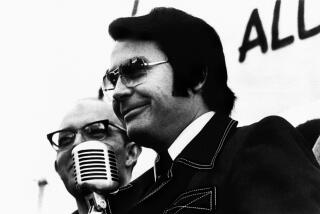A Holier Alliance
- Share via
The air was tense as the audience rallied for questions after a panel discussion on religion and public schools. An arsenal of explosive issues threatened to burst on the UC Irvine campus where the group had gathered.
All the more reason why the first query came as such a surprise.
“Do you teach humanism?” asked a middle-aged woman in a quiet voice.
The answer was just as unlikely.
“I do,” said Jim Antenore, who includes the often-overlooked topic in a course on comparative religion he offers at Irvine High School.
For 20 years, humanism--”secular humanism” to be exact--has been a dirty word. Especially when Christian Coalition leaders use it to describe anything that goes against their traditional values.
They have their reasons. A pure-bred secular humanist would say there is no heaven or hell, no single right answer to a moral dilemma, no miracles--only scientific facts, and no proof that God exists. Polar opposites to a fundamentalist Christian’s beliefs.
Antenore teaches it in his course because, “if something is controversial, I want to include it, not stay away.” He sees secular humanism as a world view, with some of the characteristics of a religion. Others describe it as a philosophy.
Lately, however, the humanist movement is going through big changes. A younger generation is steering away from atheism, skepticism and materialism toward a forgotten past. “Religious humanism” is resurfacing, shifting the ground beneath the movement’s feet.
Like the secularists, they believe in what is right and good about human nature--endeavors in the arts and sciences, social activism stemming from compassion for others. But religious humanists credit these endeavors to God as the creator and try to live by biblical teachings.
Given its tangled roots, those who claim to be part of religious humanism sound more like opponents than members of the same community. They form a loose affiliation, at best, drawn from the ranks of orthodox Catholics, Episcopalians and Anglicans as well as the most liberal of Unitarian Universalists and even some people who are not part of any religion.
Like an orchestra out of tune, they clash on every moral issue from abortion to euthanasia and even hold different convictions about the existence of God.
Part of the problem could be lack of practice.
“We’ve forgotten that ‘religious’ can modify ‘humanist,’ ” Gregory Wolfe says. “We think of the word ‘secular,’ instead.” Wolfe organizes writer and artist workshops around the country as an offshoot of “Image,” a journal for the arts and religion that he founded in 1994.
However lacking in harmony they may be, one thing bonds religious humanists closer than skin to bone. They are passionate defenders of all that is, well, human. Think of it, this has not been the popular view. The loudest voices have often told us to deny the body and live for the soul. These days, with hell-and-damnation fundamentalism blaring in one ear and EZ spirituality drifting past the other, humanness gets crushed underfoot on the road to redemption.
Even Pope John Paul II seems concerned. In October, he wrote a letter to his bishops, an encyclical titled “Faith and Reason,” clarifying his views. He comes out in favor of religious humanism, with some qualifiers.
Part of the tension between humanist and religious values has always been that faith in human endeavors can be a substitute for faith in God. John Paul II finds human discovery and divine omnipotence compatible. But he sees problems when science or philosophy is used to prove a personal opinion rather than to seek the “ultimate” truth. For him, that truth is God.
Artists and writers have tracked the tension with their sensitive antennae. Author Kathleen Norris writes about her encounters with religious faith in “Cloister Walk” (Putnam, 1996), a best seller.
Not usually one to ascribe to labels, Norris in this case is willing to be an unofficial spokeswoman for humanism.
“There’s an ancient tradition of humanism in Christianity, because Christ is divine and human” she says.
“You see it in Judaism as clearly as Christianity. It is in the Bible’s book of Genesis and in the ancient literature of the church. Humans are made in the divine image. The goal is to try living up to that.” Norris says she can live with the humanist label because she comes to it through literature, which she calls a clear expression of human resources put to a higher purpose.
Non-Christians put the accent on a different beat.
“Humanists believe in this world,” says the Rev. Khoren Arisian, the Minneapolis-based minister who leads the Unitarian Universalist’s in-house religious humanist movement, founded in 1963. “Life is not a doorway to somewhere else. What you do in this world is most important.” For him, humanism is all about taking care of other humans by helping solve society’s problems.
Arisian estimates that 50% of the Unitarian’s members (around 209,000) are religious humanists. Among Christians and Jews, no one seems to be keeping track, but a number of interfaith groups, whose members would call themselves humanists if asked, are starting to be more visible. Some emphasize the arts and humanities. Others see social action as the core of what it means to be fully human. Many emerging groups are based in California.
In Hollywood, the City of Angels film festival took up humanist themes in its annual fall festival. Between screenings of such films as Carl Dreyer’s 1928 “The Passion of Joan of Arc” and Robert Duvall’s “The Apostle” from 1997, the audience gathered for a worship service custom-made for artists. Poet and essayist Patricia Hampl led prayers, and a silent film on the beauty of nature was screened. Paul Wolff, “the Hollywood maggid” (Yiddish for “teacher” or “preacher”) read a morality tale about improving the world, one person at a time.
The Rev. Scott Young, a campus minister at UCLA and one of the festival’s founders, says it began as a response to the Los Angeles riots of 1992.
“We were looking for a way to rebuild the city,” Young says. “We began, and continue, to show films with a religious component that make us ask, ‘What is our purpose as humans in society?’ ”
Wolff, a member of Reform Judaism, says the answer is community action.
“Reform Judaism is about fixing the world,” he says. “Most good Jews would consider themselves humanists. If you’re human, you can’t not care about your brothers and sisters. You have to go beyond your own pettiness, beyond ‘me’ to ‘we.’ ”
When Pasadena’s Neighborhood Unitarian Universalist Church named the Rev. Lee Barker as its pastor in 1994, he brought his religious humanism credentials with him and made a conscience decision to get the congregation involved in community projects. Church members joined forces with other congregations to build outreach programs for Pasadena’s homeless, battered women and schoolchildren.
“We are built on service, not theology,” Barker says of his church. In the last four years, membership has grown by about 25%, to 600 adults and 250 children.
But organized religion is not always part of life for religious humanism. In Palo Alto, about 50 people meet for a weekly gathering of “Friends of Religious Humanism,” who picnic and hike after a lecture by the founder, the Rev. Bill Jacobsen, a retired Unitarian Universalist church minister.
Several members define the group in terms of what they do not stand for.
“We’re an offset to fundamentalism,” says Paul Abramson, 65. “It annoys me to no end that some people think they have the last word on what is right.”
“I don’t subscribe to spiritual things,” he adds. For him, there is no supernatural intervention. “I have control of my destiny to the extent that I can influence events in my own life.”
Some regulars in Jacobsen’s group do not want to be identified by name for fear of bashing. A Northern California businesswoman in her 50s who belongs to the Palo Alto “Friends,” creates seasonal rituals for the holidays, including Halloween and Valentine’s Day. She also presides over humanist weddings.
“I’m a firm believer in the emotional satisfaction and good health that comes in recognizing the times of our life,” like births, deaths and the four seasons, she says. That is about as close as she comes to traditional religion.
She worries that her clients would disapprove.
“I work with people who speak very openly about their religious views,” she says. “I do not. It’s part of being a humanist. When I encounter new people, they do not see humanism in a positive light.”
With so many personal visions and values represented, it is hard to imagine a common ground. Some, though, can already see it.
“All humanists believe in the dignity of human beings,” says William Franklin, dean of the Berkeley Divinity School at Yale University. “The difference is religious humanists believe that dignity comes from having a relationship with God.”
Franklin founded the Christian Humanist project 20 years ago at St. John’s University in Collegeville, Minn. This fall he brought that program’s blueprint with him as dean at Berkeley Divinity.
“People are asking more of the ultimate questions about the nature of human life,” he says. “If some come to it from a religious perspective and others do not, Christian tradition is wide enough to bear both interpretations.”
More to Read
Sign up for Essential California
The most important California stories and recommendations in your inbox every morning.
You may occasionally receive promotional content from the Los Angeles Times.










